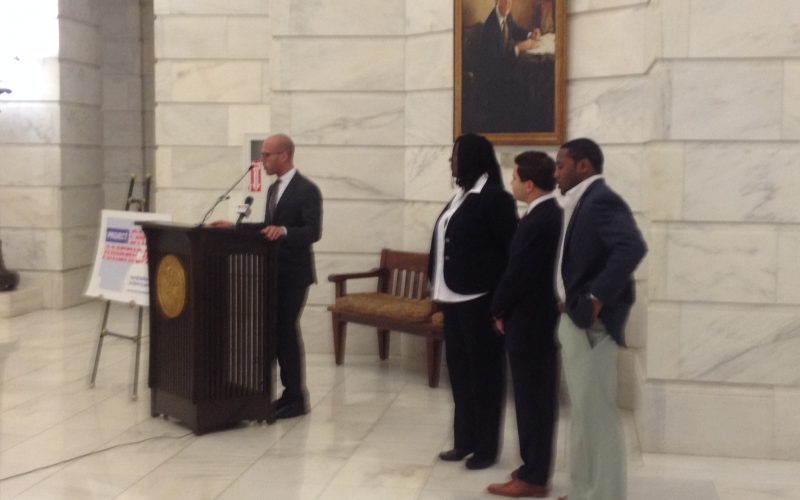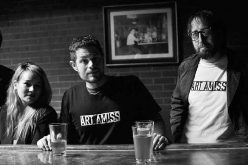
Brad Clark, director of Project One America for Human Rights Campaign, spoke at a press conference at the Arkansas state capitol building in Little Rock about the statewide survey of LGBT citizens Monday July, 28.
Staff Report
LITTLE ROCK, Ark.— The Human Rights Campaign’s (HRC) Project One America released key findings from a recent survey providing information about the challenges faced by lesbian, gay, bisexual and transgender (LGBT) Arkansans, Monday July 28.
In addition to the survey results, Project One America hired Kendra Johnson to be the Arkansas state director for the organization and will lead the group to work “to change hearts and minds, advance enduring legal protections, and build more inclusive institutions for LGBT people from the church pew to the workplace,” according to an HRC press release.
The survey results show LGBT people are contributing members at home, the workplace, in school and within their faith communities. However, LGBT Arkansans enjoy no legal protections at either the local or state level.
To address these disparities, Project One America plans to work to change hearts and minds, advance enduring legal protections, and build more inclusive institutions for LGBT people from the church pew to the workplace. The assessment—which is the largest of its kind to date — is the impetus for creating HRC Arkansas.
“The survey revealed LGBT Arkansans are just like their friends and family members—living, working, and volunteering in their communities,” said Brad Clark, Project One America director. “However, they face harsh realities living in the state they call home. We have a moral responsibility to change that.”
In February and March of this year, HRC undertook a survey on the needs, experiences, and priorities of LGBT people in Arkansas. The survey shows LGBT Arkansans are participating members of their respective communities and don’t want to leave their homes.
Fifty-eight percent of LGBT people who participated in the study have called Arkansas home for more than 20 years and 9 percent have served, or are serving, in the armed forces. Fifty-three percent of respondents volunteer in their communities and 60 percent donate money to charitable groups and nonprofits, according to the survey results.
“Pretty much everything in the results were pretty affirming (about our local community),” said James Rector, president of the Northwest Arkansas Center for Equality. “Some people may have been surprised, but I was not surprised by the results.”
Raising families is also a core component in the lives of LGBT people. 57 percent of those surveyed ages 18-25 intend to have children one day. Arkansas also has one of the highest rates of same sex couples raising children according to 2010 Census study by the Williams Institute.
“There’s this notion that a lot of people grow up dreaming of thinking they’re going to move away one day, but when they want to raise kids of their own they find they want to stay,” Rector said. “They think, ‘This is where I live, this where I want to raise my family because I grew up here.’”
Faith is another important part of so many lives of LGBT people. The study found a third are people of faith; including 44 percent of African American people. Of those surveyed, 32 percent have donated money to their respective houses of worship.
“We know faith and strong families are essential values to the lives of LGBT people,” said Project One America Faith and Religion associate director Joseph Ward. “This survey clearly shows LGBT Arkansans and their families actively participate in their churches.”
Despite LGBT people embracing the state they call home, the survey also revealed some of the hardships LGBT people face in their communities. The assessment determined 25 percent have experienced employment discrimination; 37 percent have experienced harassment at work; and 38 percent of LGBT households earning less than $45,000 experienced harassment at work.
HRC’s study also determined 39 percent have experienced harassment by members of their own family; 43 percent have experienced harassment in public establishments; 16 percent have experienced harassment from a public servant like a police officer or fire fighter; and 18 percent have experienced harassment monthly or more at their respective houses of worship.
School is also a place where LGBT students face problems. The study found 45 percent have experienced harassment at school and 44 percent of respondents say harassment is common at the high school level.
In healthcare, 82 percent of Arkansans are insured according to the Kaiser Family Foundation. However, only 25 percent of LGBT respondents surveyed by HRC have access to partner benefits.
Respondents also listed their priorities— prevent harassment and violence against LGBT people; reduce the stigma of HIV/AIDS and advance awareness of treatment and prevention; increase workplace protections; support LGBT youth in schools and their communities; and ensure LGBT families have the protections and dignity they deserve through marriage.
“Although LGBT Arkansans face challenges living in the communities they love, they remain committed to creating an environment that is safe and nurturing,” said Project One America deputy director Karin Quimby, “HRC Arkansas will work across the state to advance enduring legal protections.”
The thorough needs assessment was conducted by Anzalone Liszt Grove through HRC’s membership and the LGBT communities in Arkansas. 979 people participated through email, social media, and online ads.






